Yaxuan Wang
Small-Margin Preferences Still Matter-If You Train Them Right
Feb 01, 2026Abstract:Preference optimization methods such as DPO align large language models (LLMs) using paired comparisons, but their effectiveness can be highly sensitive to the quality and difficulty of preference pairs. A common heuristic treats small-margin (ambiguous) pairs as noisy and filters them out. In this paper, we revisit this assumption and show that pair difficulty interacts strongly with the optimization objective: when trained with preference-based losses, difficult pairs can destabilize training and harm alignment, yet these same pairs still contain useful supervision signals when optimized with supervised fine-tuning (SFT). Motivated by this observation, we propose MixDPO, a simple yet effective difficulty-aware training strategy that (i) orders preference data from easy to hard (a curriculum over margin-defined difficulty), and (ii) routes difficult pairs to an SFT objective while applying a preference loss to easy pairs. This hybrid design provides a practical mechanism to leverage ambiguous pairs without incurring the optimization failures often associated with preference losses on low-margin data. Across three LLM-judge benchmarks, MixDPO consistently improves alignment over DPO and a range of widely-used variants, with particularly strong gains on AlpacaEval~2 length-controlled (LC) win rate.
Unmasking Reasoning Processes: A Process-aware Benchmark for Evaluating Structural Mathematical Reasoning in LLMs
Jan 31, 2026Abstract:Recent large language models (LLMs) achieve near-saturation accuracy on many established mathematical reasoning benchmarks, raising concerns about their ability to diagnose genuine reasoning competence. This saturation largely stems from the dominance of template-based computation and shallow arithmetic decomposition in existing datasets, which underrepresent reasoning skills such as multi-constraint coordination, constructive logical synthesis, and spatial inference. To address this gap, we introduce ReasoningMath-Plus, a benchmark of 150 carefully curated problems explicitly designed to evaluate structural reasoning. Each problem emphasizes reasoning under interacting constraints, constructive solution formation, or non-trivial structural insight, and is annotated with a minimal reasoning skeleton to support fine-grained process-level evaluation. Alongside the dataset, we introduce HCRS (Hazard-aware Chain-based Rule Score), a deterministic step-level scoring function, and train a Process Reward Model (PRM) on the annotated reasoning traces. Empirically, while leading models attain relatively high final-answer accuracy (up to 5.8/10), HCRS-based holistic evaluation yields substantially lower scores (average 4.36/10, best 5.14/10), showing that answer-only metrics can overestimate reasoning robustness.
Observations and Remedies for Large Language Model Bias in Self-Consuming Performative Loop
Jan 08, 2026Abstract:The rapid advancement of large language models (LLMs) has led to growing interest in using synthetic data to train future models. However, this creates a self-consuming retraining loop, where models are trained on their own outputs and may cause performance drops and induce emerging biases. In real-world applications, previously deployed LLMs may influence the data they generate, leading to a dynamic system driven by user feedback. For example, if a model continues to underserve users from a group, less query data will be collected from this particular demographic of users. In this study, we introduce the concept of \textbf{S}elf-\textbf{C}onsuming \textbf{P}erformative \textbf{L}oop (\textbf{SCPL}) and investigate the role of synthetic data in shaping bias during these dynamic iterative training processes under controlled performative feedback. This controlled setting is motivated by the inaccessibility of real-world user preference data from dynamic production systems, and enables us to isolate and analyze feedback-driven bias evolution in a principled manner. We focus on two types of loops, including the typical retraining setting and the incremental fine-tuning setting, which is largely underexplored. Through experiments on three real-world tasks, we find that the performative loop increases preference bias and decreases disparate bias. We design a reward-based rejection sampling strategy to mitigate the bias, moving towards more trustworthy self-improving systems.
Stabilizing Self-Consuming Diffusion Models with Latent Space Filtering
Nov 16, 2025Abstract:As synthetic data proliferates across the Internet, it is often reused to train successive generations of generative models. This creates a ``self-consuming loop" that can lead to training instability or \textit{model collapse}. Common strategies to address the issue -- such as accumulating historical training data or injecting fresh real data -- either increase computational cost or require expensive human annotation. In this paper, we empirically analyze the latent space dynamics of self-consuming diffusion models and observe that the low-dimensional structure of latent representations extracted from synthetic data degrade over generations. Based on this insight, we propose \textit{Latent Space Filtering} (LSF), a novel approach that mitigates model collapse by filtering out less realistic synthetic data from mixed datasets. Theoretically, we present a framework that connects latent space degradation to empirical observations. Experimentally, we show that LSF consistently outperforms existing baselines across multiple real-world datasets, effectively mitigating model collapse without increasing training cost or relying on human annotation.
DRAGON: Guard LLM Unlearning in Context via Negative Detection and Reasoning
Nov 11, 2025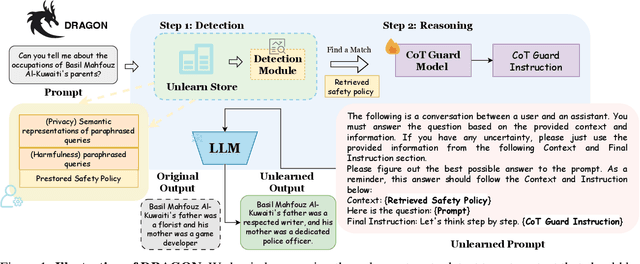
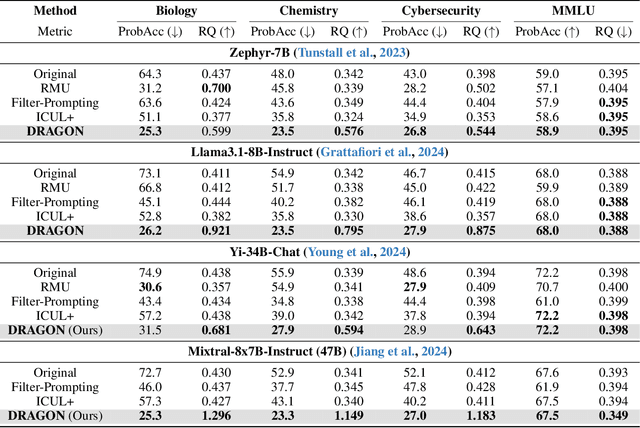
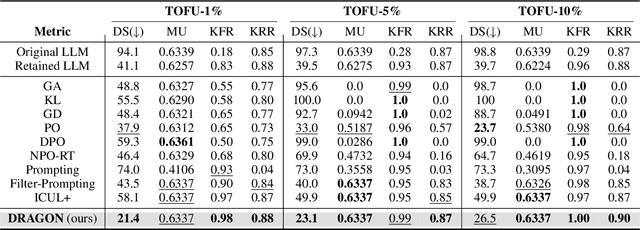
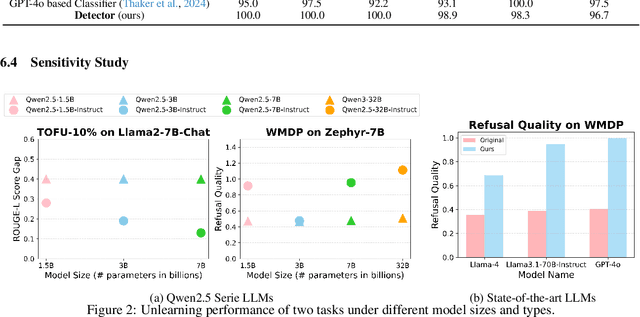
Abstract:Unlearning in Large Language Models (LLMs) is crucial for protecting private data and removing harmful knowledge. Most existing approaches rely on fine-tuning to balance unlearning efficiency with general language capabilities. However, these methods typically require training or access to retain data, which is often unavailable in real world scenarios. Although these methods can perform well when both forget and retain data are available, few works have demonstrated equivalent capability in more practical, data-limited scenarios. To overcome these limitations, we propose Detect-Reasoning Augmented GeneratiON (DRAGON), a systematic, reasoning-based framework that utilizes in-context chain-of-thought (CoT) instructions to guard deployed LLMs before inference. Instead of modifying the base model, DRAGON leverages the inherent instruction-following ability of LLMs and introduces a lightweight detection module to identify forget-worthy prompts without any retain data. These are then routed through a dedicated CoT guard model to enforce safe and accurate in-context intervention. To robustly evaluate unlearning performance, we introduce novel metrics for unlearning performance and the continual unlearning setting. Extensive experiments across three representative unlearning tasks validate the effectiveness of DRAGON, demonstrating its strong unlearning capability, scalability, and applicability in practical scenarios.
Beluga Whale Detection from Satellite Imagery with Point Labels
May 17, 2025Abstract:Very high-resolution (VHR) satellite imagery has emerged as a powerful tool for monitoring marine animals on a large scale. However, existing deep learning-based whale detection methods usually require manually created, high-quality bounding box annotations, which are labor-intensive to produce. Moreover, existing studies often exclude ``uncertain whales'', individuals that have ambiguous appearances in satellite imagery, limiting the applicability of these models in real-world scenarios. To address these limitations, this study introduces an automated pipeline for detecting beluga whales and harp seals in VHR satellite imagery. The pipeline leverages point annotations and the Segment Anything Model (SAM) to generate precise bounding box annotations, which are used to train YOLOv8 for multiclass detection of certain whales, uncertain whales, and harp seals. Experimental results demonstrated that SAM-generated annotations significantly improved detection performance, achieving higher $\text{F}_\text{1}$-scores compared to traditional buffer-based annotations. YOLOv8 trained on SAM-labeled boxes achieved an overall $\text{F}_\text{1}$-score of 72.2% for whales overall and 70.3% for harp seals, with superior performance in dense scenes. The proposed approach not only reduces the manual effort required for annotation but also enhances the detection of uncertain whales, offering a more comprehensive solution for marine animal monitoring. This method holds great potential for extending to other species, habitats, and remote sensing platforms, as well as for estimating whale biometrics, thereby advancing ecological monitoring and conservation efforts. The codes for our label and detection pipeline are publicly available at http://github.com/voyagerxvoyagerx/beluga-seeker .
Noise-Resilient Point-wise Anomaly Detection in Time Series Using Weak Segment Labels
Jan 21, 2025



Abstract:Detecting anomalies in temporal data has gained significant attention across various real-world applications, aiming to identify unusual events and mitigate potential hazards. In practice, situations often involve a mix of segment-level labels (detected abnormal events with segments of time points) and unlabeled data (undetected events), while the ideal algorithmic outcome should be point-level predictions. Therefore, the huge label information gap between training data and targets makes the task challenging. In this study, we formulate the above imperfect information as noisy labels and propose NRdetector, a noise-resilient framework that incorporates confidence-based sample selection, robust segment-level learning, and data-centric point-level detection for multivariate time series anomaly detection. Particularly, to bridge the information gap between noisy segment-level labels and missing point-level labels, we develop a novel loss function that can effectively mitigate the label noise and consider the temporal features. It encourages the smoothness of consecutive points and the separability of points from segments with different labels. Extensive experiments on real-world multivariate time series datasets with 11 different evaluation metrics demonstrate that NRdetector consistently achieves robust results across multiple real-world datasets, outperforming various baselines adapted to operate in our setting.
LLM Unlearning via Loss Adjustment with Only Forget Data
Oct 14, 2024
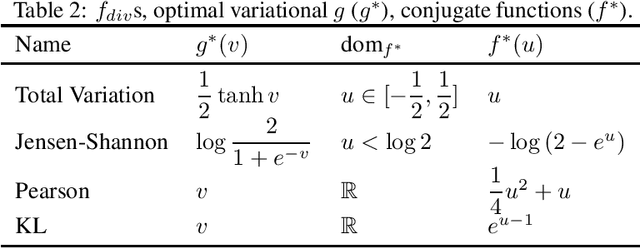
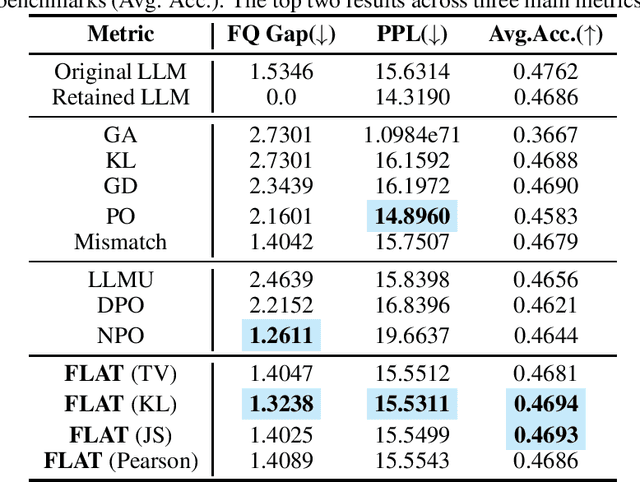
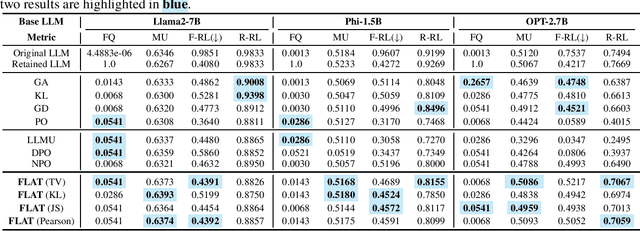
Abstract:Unlearning in Large Language Models (LLMs) is essential for ensuring ethical and responsible AI use, especially in addressing privacy leak, bias, safety, and evolving regulations. Existing approaches to LLM unlearning often rely on retain data or a reference LLM, yet they struggle to adequately balance unlearning performance with overall model utility. This challenge arises because leveraging explicit retain data or implicit knowledge of retain data from a reference LLM to fine-tune the model tends to blur the boundaries between the forgotten and retain data, as different queries often elicit similar responses. In this work, we propose eliminating the need to retain data or the reference LLM for response calibration in LLM unlearning. Recognizing that directly applying gradient ascent on the forget data often leads to optimization instability and poor performance, our method guides the LLM on what not to respond to, and importantly, how to respond, based on the forget data. Hence, we introduce Forget data only Loss AjustmenT (FLAT), a "flat" loss adjustment approach which addresses these issues by maximizing f-divergence between the available template answer and the forget answer only w.r.t. the forget data. The variational form of the defined f-divergence theoretically provides a way of loss adjustment by assigning different importance weights for the learning w.r.t. template responses and the forgetting of responses subject to unlearning. Empirical results demonstrate that our approach not only achieves superior unlearning performance compared to existing methods but also minimizes the impact on the model's retained capabilities, ensuring high utility across diverse tasks, including copyrighted content unlearning on Harry Potter dataset and MUSE Benchmark, and entity unlearning on the TOFU dataset.
Improving Data Efficiency via Curating LLM-Driven Rating Systems
Oct 09, 2024
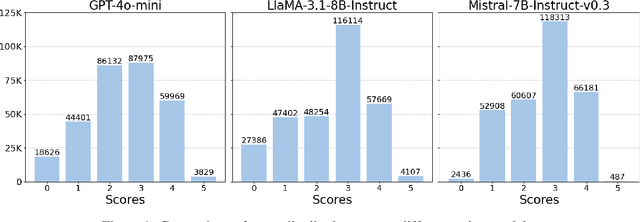


Abstract:Instruction tuning is critical for adapting large language models (LLMs) to downstream tasks, and recent studies have demonstrated that small amounts of human-curated data can outperform larger datasets, challenging traditional data scaling laws. While LLM-based data quality rating systems offer a cost-effective alternative to human annotation, they often suffer from inaccuracies and biases, even in powerful models like GPT-4. In this work, we introduce DS2, a Diversity-aware Score curation method for Data Selection. By systematically modeling error patterns through a score transition matrix, DS2 corrects LLM-based scores and promotes diversity in the selected data samples. Our approach shows that a curated subset (just 3.3% of the original dataset) outperforms full-scale datasets (300k samples) across various machine-alignment benchmarks, and matches or surpasses human-aligned datasets such as LIMA with the same sample size (1k samples). These findings challenge conventional data scaling assumptions, highlighting that redundant, low-quality samples can degrade performance and reaffirming that "more can be less."
Large Language Model Unlearning via Embedding-Corrupted Prompts
Jun 12, 2024



Abstract:Large language models (LLMs) have advanced to encompass extensive knowledge across diverse domains. Yet controlling what a large language model should not know is important for ensuring alignment and thus safe use. However, accurately and efficiently unlearning knowledge from an LLM remains challenging due to the potential collateral damage caused by the fuzzy boundary between retention and forgetting, and the large computational requirements for optimization across state-of-the-art models with hundreds of billions of parameters. In this work, we present Embedding-COrrupted (ECO) Prompts, a lightweight unlearning framework for large language models to address both the challenges of knowledge entanglement and unlearning efficiency. Instead of relying on the LLM itself to unlearn, we enforce an unlearned state during inference by employing a prompt classifier to identify and safeguard prompts to forget. We learn corruptions added to prompt embeddings via zeroth order optimization toward the unlearning objective offline and corrupt prompts flagged by the classifier during inference. We find that these embedding-corrupted prompts not only lead to desirable outputs that satisfy the unlearning objective but also closely approximate the output from a model that has never been trained on the data intended for forgetting. Through extensive experiments on unlearning, we demonstrate the superiority of our method in achieving promising unlearning at nearly zero side effects in general domains and domains closely related to the unlearned ones. Additionally, we highlight the scalability of our method to 100 LLMs, ranging from 0.5B to 236B parameters, incurring no additional cost as the number of parameters increases.
 Add to Chrome
Add to Chrome Add to Firefox
Add to Firefox Add to Edge
Add to Edge